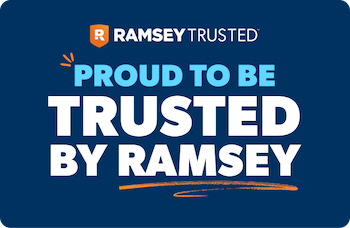
 Ross Anderson, CFP® & Dave Ramsey
Ross Anderson, CFP® & Dave Ramsey
Dave Ramsey has built a tremendous brand based on shooting it straight, common sense advice, and trust. As a RamseyTrusted professional, I embrace the thoughtful path to wealth creation based on the same common sense principles that Dave has been championing and teaching for years.
Book time Directly On My Calendar to chat about where you are on your journey! As a fee-only, and fiduciary standard firm, we are committed to Dave’s principles of giving you the facts without selling any commissioned products whatsoever.
Here’s how we align with Dave’s 7 Baby Steps:
Baby Step 1
Save $1,000 for your starter emergency fund.
Ross’ Thoughts: One of the most common things I see when families are struggling with debt is that they make the biggest payments they possibly can against the credit card each month when they get paid. The problem is… The very next day when they go to spend money, they have to lean on credit again! This can turn into an endless cycle that will have you spinning your wheels.
Even if you want to be as aggressive as possible in paying down your debt, having a cash cushion is a critical first step in ensuring that you can break the cycle of debt forever.
Baby Step 2
Pay off all debt (except the house) using the debt snowball.
Ross’ Thoughts: Wealthy people earn interest instead of paying it. The fact of the matter is that every dollar you pay in interest to a bank is one less that you have to invest for your future. Here’s the good news… The behavioral muscle that you build by paying off debt is the same one that you’ll use to save and build wealth. If you get good at this, you’ll become a good saver/investor. Paying down debt requires that you earn money that you won’t consume right now. This is the most important skill that you will need to master to build wealth and financial freedom.
Baby Step 3
Save 3–6 months of expenses in a fully funded emergency fund.
Ross’ Thoughts: How many months seems to target seems to be a big debate. Some advisors say 3, some say 6. If you listen to Suze Orman, she’ll tell you its 9. The real answer is personal to you and your situation. Are you in a stable job with a predictable salary? Three months might be perfect for you. Are you the sole breadwinner for a family of 3+ and your family is counting on your ability to work consistently? Six months is a better target. Do you work on a commissions or incentives of some sort and have huge variations from month-to-month in your income? You may decide that more than six months is the right target to absorb any bumps in the road.
If you’re working on Baby Step 3, you might find yourself frustrated on having so much cash sitting around that isn’t earning you a ton of money. And it’s true, most of the time even a high yield savings will just barely keep up with inflation. But building this strong foundation is critical to your ability to aggressively build wealth in the future.
Baby Step 3b
Save for a down payment on a house.
Ross’ Thoughts: You will likely never make a bigger purchase in your life than a home. And while plenty of people talk about what a great investment real estate is (and sometimes it can be) the real key is that you’re building peace of mind into your life. You’re creating a place where you and your family can feel settled. And financially, you’re slowing the ability of inflation to keep eating away at your wealth creation.
Think of it this way. If you had a home mortgage that cost you $2,500 per month today, and inflation is 2.5% per year… 15 years from now, that same $2,500 payment will only feel like $1,710 per month in today’s dollars. That means in real-dollar terms your cost of housing actually drops by 30% over the course of 15 years rather than facing the persistent increases in rent. That’s putting inflation on your side rather than just letting it eat away at your ability to save.
While that all sounds great, if you haven’t been able to save for a down payment yet, you’re not ready to buy a home yet either. Owning a home means that you have a higher level of responsibility. If things break or need repair, you don’t get to call the landlord and ask them to fix it. So you need to make sure you’re on solid financial footing before you take on this level of responsibility.
Baby Step 4
Invest 15% of your household income in retirement.
Ross’ Thoughts: If I only got to ask one single question to evaluate whether or not someone was on-track for retirement, it would be: “What percentage of your income do you save for the future?” That answer alone will tell me 85% of what I need to know in order to determine if you’re on track.
A savings target of 15% is what most people need to have a “traditional age” retirement plan. When we say that, we’re typically talking about early to mid-60s. If your goal is to retire before that, you might need to be more aggressive in how you’re saving. And even if you plan to keep working as long as you can, we need to make sure that we’re prepared if there is anything that prevents you from continuing to do your work.
In many cases, rather than “Retirement” we should think of this as investing for Financial Independence. Once you reach this point, if you go to work the next day, it’s on your terms. Reaching independence means you hold the cards on how you spend your time and who you spend it with.
Baby Step 5
Save for your children’s college fund.
Ross’ Thoughts: The cost of college has been absolutely skyrocketing for decades. If you wait until an 18th birthday to think about how to pay for your kids’ education, I promise it won’t be a fun time. However, there are some fantastic tax incentives baked into the system to help with these costs. Whether a 529 plan, Coverdell plan, or any other savings program makes sense for you is a big part of making sure you have a solid foundation to your finances. It’s important to remember that your retirement accounts may not be accessible yet when your kids get to this point, so we want to focus on liquidity and accessibility when it comes to planning for college or secondary education.
Baby Step 6
Pay off your home early.
Ross’ Thoughts: If you decide to work with me, you’ll probably hear me say this a lot: “Retirement is a cash flow problem, not a wealth problem.” What we are typically solving for is where your money is going to come from after you stop working and stop receiving paychecks. Well if you have your home paid off, you need a heck of a lot less cash flow to make it all work. You’ll see this in our retirement projections that paying off a mortgage puts less stress on a portfolio because it means you don’t need as much cash to feel like you’re still living the same lifestyle. And, as we noted above, paying interest means you’re not earning it.
We can help you put together a game plan on when you’ll be mortgage free and how that impacts the rest of your planning moving forward.
Baby Step 7
Build wealth and give.
Ross’ Thoughts: Building wealth is a freeing experience. Once you get to this point it unlocks a world of possibilities from being generous with family, church, friends, and more.
Don’t get me wrong, we know the baby steps aren’t easy, but they are simple. This isn’t a formula of guessing what works, it’s a proven recipe to put you on a path toward financial freedom. To quote Dave, “If you will live like no one else, later you can live like no one else.”
Book a Consultation Today so we can help you evaluate your path toward financial freedom!

